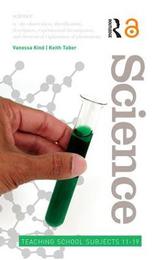
|
Science
Paperback
Main Details
| Title |
Science
|
| Authors and Contributors |
Edited by Vanessa Kind
|
|
Edited by Keith Taber
|
| Series | Teaching School Subjects 11-19 |
|---|
| Physical Properties |
| Format:Paperback | | Pages:304 | | Dimensions(mm): Height 216,Width 138 |
|
| Category/Genre | General |
|---|
| ISBN/Barcode |
9780415342834
|
| Classifications | Dewey:507.1241 |
|---|
| Audience | | Tertiary Education (US: College) | | Professional & Vocational | |
|---|
| Illustrations |
10 black & white tables
|
|
Publishing Details |
| Publisher |
Taylor & Francis Ltd
|
| Imprint |
Routledge Falmer
|
| Publication Date |
12 May 2005 |
| Publication Country |
United Kingdom
|
Description
In recognizing that new teachers often feel disempowered by the subject expertise they bring into teaching, this book not only covers the training standards for NQTs and the Induction Standards, but takes the reader beyond this by fully exploring issues relating to subject knowledge in learning to teach. Divided into three sections the book covers: - framing the subject - defining subject knowledge and focusing on questions about science as a school subject - teaching the subject - looking at pedagogical, curricular and pupil knowledge - science within the professional community - focussing on the place of science within the wider curriculum and the teaching community. This refreshing new book provides stimulating assistance to subject specialists, from new teachers of science in the early years of professional development to those on a PGCE course or in their induction year. It is also suitable for subject leaders with mentor responsibilities and Advanced Skills Teachers undertaking specialist inset and teaching support.
Reviews'Overall, the book offers a clear and helpful frame for conceptualizing a view of the professional science teacher as one who embraces the notion of recognizing personal agency and responsibility in both the construction of knowledge for science teaching and the construction of knowledge about science teaching.' -- International Journal of Science Education Vol. 28, No. 12, 6 October 2006 'A text such as this can provide a stimulus for critical reflection on issues that confront science teachers and nurture their professional learning. Obvious potential readers of this book are preservice/beginning science teachers and their teacher educator/mentors, although possible other audiences include students beginning graduate study in science education.' -- International Journal of Science Education Vol. 28, No. 12, 6 October 2006
|